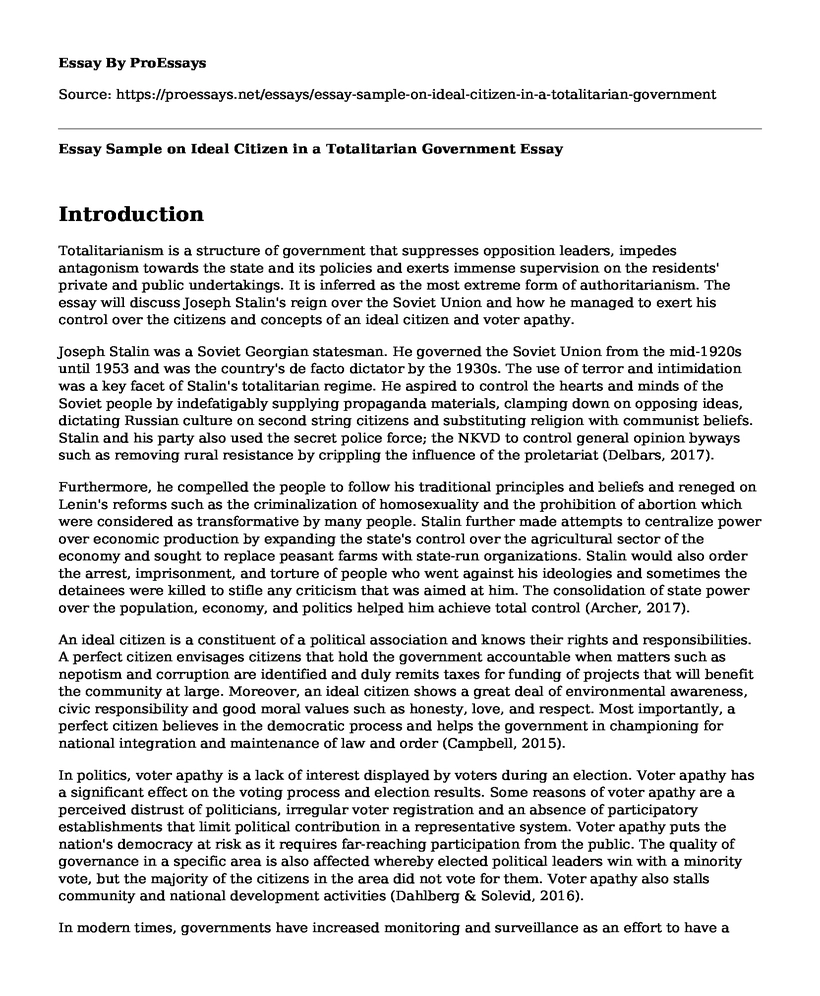Introduction
Totalitarianism is a structure of government that suppresses opposition leaders, impedes antagonism towards the state and its policies and exerts immense supervision on the residents' private and public undertakings. It is inferred as the most extreme form of authoritarianism. The essay will discuss Joseph Stalin's reign over the Soviet Union and how he managed to exert his control over the citizens and concepts of an ideal citizen and voter apathy.
Joseph Stalin was a Soviet Georgian statesman. He governed the Soviet Union from the mid-1920s until 1953 and was the country's de facto dictator by the 1930s. The use of terror and intimidation was a key facet of Stalin's totalitarian regime. He aspired to control the hearts and minds of the Soviet people by indefatigably supplying propaganda materials, clamping down on opposing ideas, dictating Russian culture on second string citizens and substituting religion with communist beliefs. Stalin and his party also used the secret police force; the NKVD to control general opinion byways such as removing rural resistance by crippling the influence of the proletariat (Delbars, 2017).
Furthermore, he compelled the people to follow his traditional principles and beliefs and reneged on Lenin's reforms such as the criminalization of homosexuality and the prohibition of abortion which were considered as transformative by many people. Stalin further made attempts to centralize power over economic production by expanding the state's control over the agricultural sector of the economy and sought to replace peasant farms with state-run organizations. Stalin would also order the arrest, imprisonment, and torture of people who went against his ideologies and sometimes the detainees were killed to stifle any criticism that was aimed at him. The consolidation of state power over the population, economy, and politics helped him achieve total control (Archer, 2017).
An ideal citizen is a constituent of a political association and knows their rights and responsibilities. A perfect citizen envisages citizens that hold the government accountable when matters such as nepotism and corruption are identified and duly remits taxes for funding of projects that will benefit the community at large. Moreover, an ideal citizen shows a great deal of environmental awareness, civic responsibility and good moral values such as honesty, love, and respect. Most importantly, a perfect citizen believes in the democratic process and helps the government in championing for national integration and maintenance of law and order (Campbell, 2015).
In politics, voter apathy is a lack of interest displayed by voters during an election. Voter apathy has a significant effect on the voting process and election results. Some reasons of voter apathy are a perceived distrust of politicians, irregular voter registration and an absence of participatory establishments that limit political contribution in a representative system. Voter apathy puts the nation's democracy at risk as it requires far-reaching participation from the public. The quality of governance in a specific area is also affected whereby elected political leaders win with a minority vote, but the majority of the citizens in the area did not vote for them. Voter apathy also stalls community and national development activities (Dahlberg & Solevid, 2016).
In modern times, governments have increased monitoring and surveillance as an effort to have a measure of control among citizens. Some ways include censoring criticism aimed at the government by imprisoning opposition leaders, use of spies and informants to get information from unsuspecting citizens, control of the media to dictate what they want citizens to view and read and regulating the internet. Governments also use electronic surveillance by placing trackers in electronic devices that give away information about users. Additionally, implementation of draconian laws helps to maintain a sense of control over citizens by instilling fear in them (Rhodes, 2018).
Conclusion
Conclusively, this essay has looked into a totalitarian regime and how the ruler attempted and managed to exercise control over the citizens by using fraudulent means and laws. Additionally, facets that affect citizens in a country such as voter apathy and the consequences have been discussed and how governments seek to have the upper hand in the rule of citizens.
References
Archer, J. (2017). Man of Steel: Joseph Stalin: Russia's Ruthless Ruler. Simon and Schuster.Campbell, V. (2015). Theorizing citizenship in citizen journalism. Digital Journalism, 3(5), 704-719.
Dahlberg, S., & Solevid, M. (2016). Does corruption suppress voter turnout?. Journal of Elections, Public Opinion and Parties, 26(4), 489-510.
Delbars, Y. (2017). The Real Stalin (Routledge Library Editions: Joseph Stalin). Routledge.Rhodes, R. A. W. (2018). Control and power in central-local government relations. Routledge.
Cite this page
Essay Sample on Ideal Citizen in a Totalitarian Government. (2022, Nov 15). Retrieved from https://proessays.net/essays/essay-sample-on-ideal-citizen-in-a-totalitarian-government
If you are the original author of this essay and no longer wish to have it published on the ProEssays website, please click below to request its removal:
- Compare and Contrast Mao Zedong and Kim Jong Un's Method of Enforcement
- US Imperialism and Empire Building Essay
- How the Constitution Changed the Articles of Confederation - Essay Sample
- Documentary Analysis Essay on Park Avenue: Money, Power and the American Dream
- Essay Example on Supreme Court Judgments: Federal Govt. & States Relationship
- Paper Example on Plato's Search for Justice: Fear of Punishment or Doing What's Right?
- Paper Example on COVID-19: Global Economic Crisis - Millions Infected, Businesses Counting Losses







